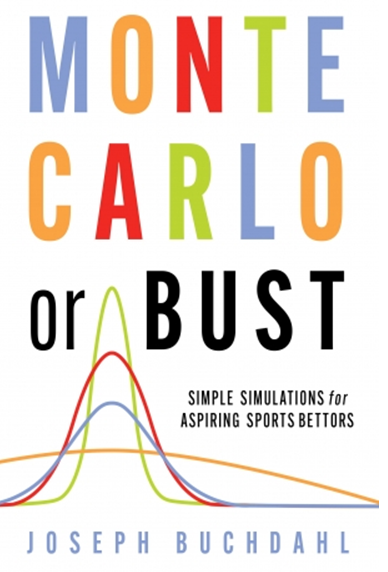I first had the pleasure of meeting Joe Buchdahl in 2010. Here's my review of his latest book published in December 2021.
Monte Carlo or Bust by Joseph Buchdahl
I’ve been running my own football ratings service since 2006. I was inspired to do so after reading Joe Buchdahl’s first book, ‘Fixed Odds Sports Betting’.
Whatever Joe writes is essential reading for anyone aspiring to be a successful bettor. This book is no exception.
The aim is to demystify probability, uncertainty and luck and their roles in betting.
The first two chapters listed below provide valuable insights into understanding probability and statistics, giving the reader a basic grounding.
This is most certainly sound advice as short-term bad luck can last much longer than most people imagine.
Drawdowns and The Risk of Ruin also come under scrutiny.
Joe deduces, “Given that the original lucky sample size was 2,760, do you see how easy it is to be fooled by the law of small numbers? ‘Small’ is relative. It can be a rather big number indeed.”
The chapter draws to a close with, “Learning that betting is largely a game of luck is not something people want to accept. A large dose of overconfidence usually helps them circumnavigate this message. For most, however, their prospects of becoming a winner through real expected value rather than luck will not change. If you are one of those who wants to do more than just live in this illusion, let me offer you five points for consideration…”.
The five point list can be found on page 346.
Final Summary:
In an industry often filled with misinformation and spin (I could have used more graphic phrases but won’t!), Joe Buchdahl is the go to man if you want to know the truth. He has the experience, knowledge and intellectual wherewithal to put you right. Whilst some may proffer he has a somewhat negative attitude towards the prospects of being a long-term winner, I prefer to take the view his attitude is a realistic one. Anyone underestimating the challenge is almost certain to fail.
I doubt this is the type of book you will read in one go. I would also suggest it’s probably not good bedtime reading either unless you want to wake up at two in the morning with a buzzing head! It’s a serious book for serious bettors; something you will keep returning to over and over again. As mentioned earlier, not all of the in-depth analysis will be for you but even if you don’t get busy with your spreadsheets, you will learn a great deal and be a better bettor for reading Monte Carlo or Bust.
Mike Lindley
I’ve been running my own football ratings service since 2006. I was inspired to do so after reading Joe Buchdahl’s first book, ‘Fixed Odds Sports Betting’.
Whatever Joe writes is essential reading for anyone aspiring to be a successful bettor. This book is no exception.
The aim is to demystify probability, uncertainty and luck and their roles in betting.
The first two chapters listed below provide valuable insights into understanding probability and statistics, giving the reader a basic grounding.
- The Story of the Monte Carlo Simulation
- A Little Probability & Statistics
- How To Build A Monte Carlo Simulation
- Prediction Models
- Winning
- Losing
This is most certainly sound advice as short-term bad luck can last much longer than most people imagine.
Drawdowns and The Risk of Ruin also come under scrutiny.
- Staking
- Tipping
- Odds & Sods
- A Game Of Luck Or Skill
Joe deduces, “Given that the original lucky sample size was 2,760, do you see how easy it is to be fooled by the law of small numbers? ‘Small’ is relative. It can be a rather big number indeed.”
The chapter draws to a close with, “Learning that betting is largely a game of luck is not something people want to accept. A large dose of overconfidence usually helps them circumnavigate this message. For most, however, their prospects of becoming a winner through real expected value rather than luck will not change. If you are one of those who wants to do more than just live in this illusion, let me offer you five points for consideration…”.
The five point list can be found on page 346.
- A Cautionary Tale
Final Summary:
In an industry often filled with misinformation and spin (I could have used more graphic phrases but won’t!), Joe Buchdahl is the go to man if you want to know the truth. He has the experience, knowledge and intellectual wherewithal to put you right. Whilst some may proffer he has a somewhat negative attitude towards the prospects of being a long-term winner, I prefer to take the view his attitude is a realistic one. Anyone underestimating the challenge is almost certain to fail.
I doubt this is the type of book you will read in one go. I would also suggest it’s probably not good bedtime reading either unless you want to wake up at two in the morning with a buzzing head! It’s a serious book for serious bettors; something you will keep returning to over and over again. As mentioned earlier, not all of the in-depth analysis will be for you but even if you don’t get busy with your spreadsheets, you will learn a great deal and be a better bettor for reading Monte Carlo or Bust.
Mike Lindley
